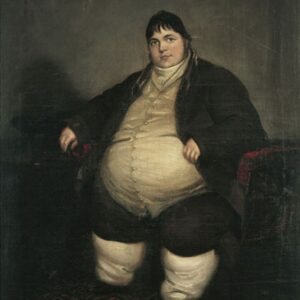I am obese. Angelo doesn’t want me to discuss his weight, but suffice it to say he gets the same advice as I do at his annual physical. The obese designation comes from the BMI (Body Mass Index) chart the doctor annoyingly has on hand when we go in for our checkups. The (same) advice we get is to lose weight, get more exercise and build muscle mass. Other than that, he’ll see us next year, have a good summer. Fortunately, we’re not alone: according to the World Health Organization (WHO) , over 650 million adults worldwide are obese. It’s a wonder the Earth can hold us all up.
So, we are part of a huge global epidemic and all the advice we get is, “lay off the pasta.” (Which we probably won’t do. He’s Italian.) It used to be that a man proudly displayed his girth because it meant he was wealthy enough to eat, and eat well at that. In art, powerful men were represented as massive; overweight women represented beauty or fertility. Eating with abandon, plentiful food, frequent meals were a sign of privilege and means; being thin meant poverty and disease.

It’s switched up now . . . thin is in and fat is out. We can thank science for that–once the relationship between cardiovascular disease and saturated fats was discovered, glorifying the overweight body was over. High blood pressure, diabetes, stroke, sleep apnea and other health concerns related to carrying an extra 50 pounds or more on your bones was a death knell for extra helpings of Fettucine Alfredo or a Saturday morning trip to the bakery for a dozen or so glazed doughnuts.
But it’s not just health concerns that have changed our perception of obesity. Obesity makes people uncomfortable, and it’s not always because they’re worried about someone’s health. When popular culture followed science, thin became beautiful, fat became ugly. Fat became associated with disease and unhappiness, rather than the welcome characterizations of the previous hundreds of years. In movies, television and magazines, the models showing us what we’re supposed to look like grew thinner and thinner. The “normal” weight on the BMI chart has a range of about 20-40 pounds, depending on how tall you are. So, if you’re 5’6 you’ve got about 30 pounds to play with starting at 118. As soon as you hit 155, you’re overweight and at 186, you’re obese. As with most issues we face in our country, it’s fear that plays a big part in how we treat our neighbors and friends. Family, too. Are we afraid that fat is contagious? If we stand too close to the fat guy in line at the grocery, can we actually feel a pound or two added to our bellies? Will we catch their obvious lack of self-control? Will we turn lazy?
Even as I continue my daily struggle to lose weight and “fit in” I have to admit I’m part of the problem. I secretly judge the overweight woman sitting alone at Starbucks eating a pastry (the same one for which I already checked the calorie count and dismissed) and drinking a foamy, sweet, fattening creamy latte–the calories of which I’ve also noted–and passed on. And it’s not even that I’m passing on these sweet treats…I know better. After years of social and familial messaging, I am someone who shouldn’t eat that.
I grew up in the “Children are starving in China” era of finishing your meals. This era had the double benefit of instilling guilt and fat. My grandmother used to lament that I’d never find a boyfriend if I remained pleasantly plump at the same time she heaped another serving of Swedish meatballs and mashed potatoes onto my already-cleaned plate.

One of my most humiliating experiences as a child was when a so-called friend (not overweight) conspired with the neighborhood boy I had a crush on to set up a meeting so he could tell me something “important.” Even as I think back on it from the wisdom and maturity of nearly 50 years, the memory makes me cringe as I think of myself waiting in the kitchen at her house for him to come over. My first clue that something was amiss should have been her barely stifled giggling as I sat there hopeful and nervous thinking he was finally going to confess he liked me, too. But no, that wasn’t his declaration. “You need to lose weight!” he blurted out as he and my friend dissolved in laughter. And I slunk out the kitchen door to run home to the safety of my bedroom, vowing to never eat again. Which of course lasted until dinner that night.
Is it an epidemic or a mindset? If obesity is a global health crisis so much that it is a Target Goal of the World Health Organization, why are we shaming fat people? Is that the way we, as a nation, care for our medically vulnerable? Why are we scared, disgusted, judgmental of those who are clearly suffering from an actual medical condition? And, if obesity is medical, how in the world does society determine if one’s weight is “normal” or not? If you are technically obese, but otherwise healthy and in shape, you still have to deal with the scrutiny and bias of a social norm that tells you you don’t literally and figuratively fit in.
“Plus” is usually a positive term until it’s connected by a hyphen with the word “size.” There is no question that obesity has a negative connotation, so when a beautiful woman like Hunter McGrady, a “plus-size” model becomes a cover girl, her appearance is met with derision and insults. In over 2,000 comments from a recent article on her rise to cover girl status, those praising her work and her body positivity were few. The rest were ill-meaning and sarcastic. Thinner, less-curvy models are usually spared such contempt, but for some reason insulting an overweight woman is socially acceptable. (On the other hand, a friend’s daughter who is naturally very thin–and a model–gets the same insulting and sarcastic comments on her rail-thin looks. Maybe we’re just a country of jerks.)
Obesity and food addiction need to be addressed; healthy lifestyles and personal choices need to be supported. We don’t blame all cancer patients for needing chemo, why blame all fat people for overburdening our health care system. It’s not fat people, it’s people with obesity. It seems to me we need to eliminate the shaming part from the medical component of obesity in order to accurately and effectively treat the disease. In fact, why blame those in need of healthcare at all? How about we blame our failing healthcare system–or should I say “insurance-care” system? But that’s a column for another day.












